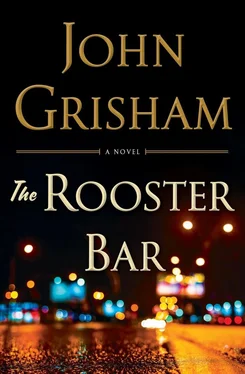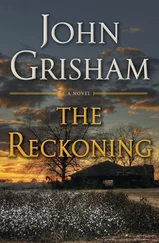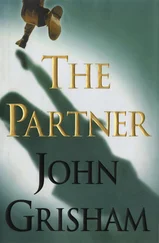“Do you know his name?”
“No. I’ve tried to find out, but no luck.”
Mark said, “Okay, maybe later, but for now we gotta find Gordy.”
They drank coffee and pondered the impossibility of finding him in the city. A waitress stopped by and asked about breakfast. They declined. No one had an appetite.
“Any ideas?” Mark asked Zola.
She shook her head. “Not really. In the past week he’s disappeared twice. The first time he took a train to New York and was gone for three days. When he got back he didn’t say much, just that he was on the trail of the Great Satan. I think he talked to some people up there. He hung around for a day or so; we were together most of the time. He was drinking and slept a lot. Then I came home from work and he was gone again. For two days, nothing. That was when he found the law professor who’d been fired from Foggy Bottom.”
“Did you know what he was doing?” Todd asked.
“No. Two days ago he locked himself in his apartment and wouldn’t see me. I think that was when he moved the furniture and went to work on the wall.”
“How much do you know about his condition?” Mark asked.
She took a deep breath and hesitated. “This is all confidential, guys, you understand? He swore me to secrecy.”
“Come on, Zola, we’re all in this together,” Mark said. “Of course it’s confidential.”
She glanced around as if others were listening. “Back in September, I found his pills, so we talked about it. He was diagnosed as bipolar when he was in college and didn’t tell anyone, not even Brenda. He told her sometime later, so she knows. Through therapy and meds he’s kept things together nicely.”
“I never knew it,” Mark said.
“Neither did I,” Todd said.
Zola continued. “It’s not unusual for people who are bipolar to reach a point where they believe they no longer need the meds. They feel great and convince themselves they can live just fine without them. So they stop taking them, things soon begin to spiral down, and they often turn to self-medication. That’s what happened to Gordy, though he was also feeling a lot of other pressures. All this law school mess, couldn’t find a job, the loans, and to make it all worse he felt as though he was getting pushed into a wedding. He was in bad shape by Thanksgiving but worked hard to conceal it.”
“Why didn’t you tell us?”
“Because he would hate me. He was convinced he could man up and somehow survive. And, looking back, most of the time he was okay. But the mood swings got worse, as did the drinking.”
“You should have told us,” Mark said.
“I didn’t know what to do. I’ve never dealt with something like this before.”
“Pointing fingers will not help right now,” Todd said to Mark.
“I’m sorry.”
Todd glanced at his cell phone and said, “It’s almost eight. Nothing from Gordy. I’m supposed to go to the bar at noon and work a shift. What’s everybody else doing today?”
Zola said, “I go in at ten for a few hours.” She was working as a temp in a small accounting firm.
Mark said, “Well, I came back early to get away from home and hopefully put together a plan to start studying for the bar exam, but I really don’t want to. I suppose I’ll drift on over to Ness Skelton and kill the day sucking up to my future bosses, trying to appear needed and relevant. For no pay, of course. I’m sure they need some help in the copy room.”
“Gotta love the law,” Todd said. “I’ll accomplish more in the bar.”
“Thanks.”
Zola said, “I suppose all we can do is wait.”
Todd paid for the coffee and they left the diner. They had walked a block when Zola’s phone vibrated. She pulled it from a pocket, looked at it, stopped, and said, “It’s Gordy. He’s at Central Jail.”
At 4:35 a.m., Gordy was stopped after an officer noticed his Mazda weaving along Connecticut Avenue. He stumbled during a field sobriety test and eventually agreed to blow. He registered 0.11 on the mobile monitor and was immediately handcuffed and placed in the rear seat of the police car. A tow truck hauled his car to the city lot. At Central, he blew again with the same result. He was fingerprinted, photographed, booked, and thrown into the drunk tank with six others. At 8:00 a.m., a bailiff led him to a small room, handed him his phone, and told him he could use it once. He called Zola, and the bailiff took his phone and led him back to the cell.
Thirty minutes later, his three friends walked through the front door at Central, got themselves scanned by a metal detector, and were directed to a large room where, evidently, families and friends came to retrieve their loved ones after a bad night. It was lined with chairs along three walls, with magazines and newspapers scattered about. Behind a large window at the far end two uniformed clerks were busy with paperwork. Cops milled around, some chatting with dazed and nervous people. There were about a dozen of them — parents, spouses, friends — all with the same spooked looks and fidgety manners. Two men in bad suits and battered briefcases seemed right at home. One was chatting up a cop who appeared to know him well. The other was huddled with a middle-aged couple. The mother was crying.
Mark, Todd, and Zola found seats in a corner and took in the surroundings. After a few minutes, Mark walked to the window and offered a sappy smile to a clerk. He said he was there to get his friend Gordon Tanner, and the clerk checked some paperwork. She nodded toward the seats and said it would take some time. Mark returned to his chair between Todd and Zola.
The lawyer chatting with the cop watched them carefully and soon came over. His three-piece suit was made of a slick bronze fabric. His shoes were shiny and black, with long pointed toes that flipped up at the tips. His shirt was baby blue and his thickly knotted tie was pale green and matched nothing else. On one wrist he wore a large gold watch with diamonds and on the other he displayed two bulky gold bracelets. His hair was greased back and bunched behind his ears. Without a smile he delivered his standard line, “Here for a DUI?”
Mark said, “Yes.”
The lawyer was already passing out his business cards. Darrell Cromley, Attorney-at-Law. DUI Specialist. Each of the three got a card as Darrell asked, “Who’s the lucky guy?”
“Our friend,” Todd said.
“First time?” Darrell asked happily.
“Yes, first time,” Mark replied.
“Sorry to hear. I can help. It’s all I do, DUIs. I know all the cops, judges, clerks, bailiffs, the ins and outs of the system. I’m the best in the business.”
Careful not to say anything that might show the slightest interest in hiring the guy, Mark asked, “Okay, so what’s he looking at?”
Darrell deftly pulled over a folding chair and faced the three. Without missing a beat, he asked, “What’s his name?”
“Gordon Tanner.”
“Well, Tanner blew a 0.11, so there’s not much wiggle room. First you gotta pay two hundred bucks to get him out. PRB, personal recognition bond. They’ll process him in about an hour and he can go. Cost you another two hundred to spring his car. It’s over at the city pound. Take half an hour or so to get it out. He’ll have a court date in a week or so. That’s where I come in. My fee is a thousand bucks cash.”
“He keeps his license?” Todd asked.
“Sure, until he’s convicted, in about a month. Then he’ll lose it for a year, pay a fine of five thousand, but I can get some of that knocked off. I’m really a bargain, you know? Plus he’s facing five nights in jail, but I can work some magic there too. We’ll sign him up for community service and keep him out. Believe me, I know the ropes. You guys in school or something?”
Читать дальше












